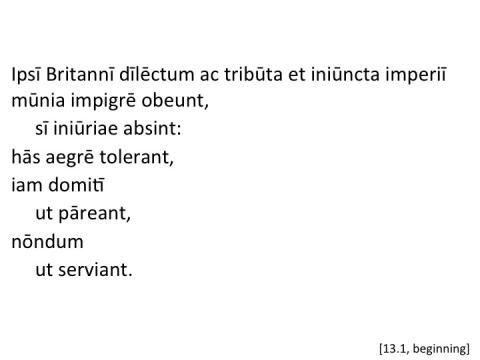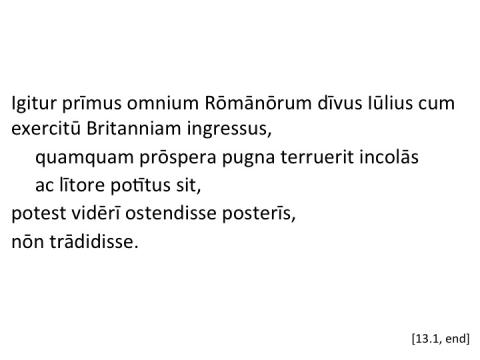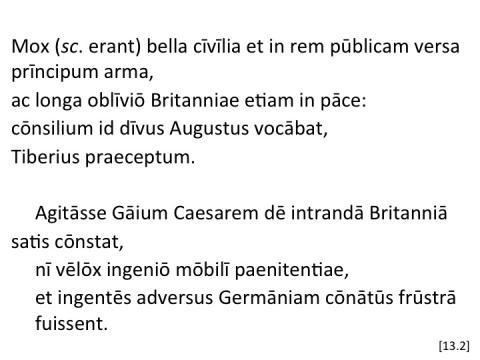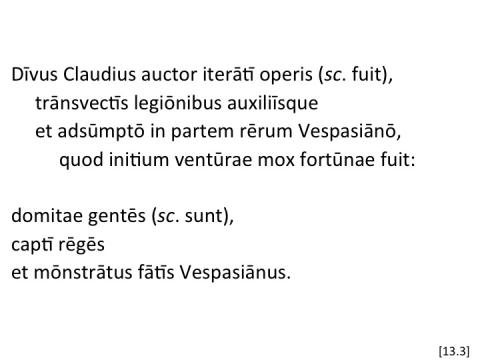[13.1] Ipsī Britannī dīlēctum ac tribūta et iniūncta imperiī mūnia impigrē obeunt, sī iniūriae absint: hās aegrē tolerant, iam domitī ut pāreant, nōndum ut serviant. Igitur prīmus omnium Rōmānōrum dīvus Iūlius cum exercitū Britanniam ingressus, quamquam prōspera pugna terruerit incolās ac lītore potītus sit, potest vidērī ostendisse posterīs, nōn trādidisse. [13.2] Mox bella cīvīlia et in rem pūblicam versa prīncipum arma, ac longa oblīviō Britanniae etiam in pāce: cōnsilium id dīvus Augustus vocābat, Tiberius praeceptum. Agitāsse Gāium Caesarem dē intrandā Britanniā satis cōnstat, nī vēlōx ingeniō mōbilī paenitentiae, et ingentēs adversus Germāniam cōnātūs frūstrā fuissent. [13.3] Dīvus Claudius auctor iterātī operis, trānsvectīs legiōnibus auxiliīsque et adsūmptō in partem rērum Vespasiānō, quod initium ventūrae mox fortūnae fuit: domitae gentēs, captī rēgēs et mōnstrātus fātīs Vespasiānus.
notes
Overview: Tacitus begins his account of the political history of Britain; Roman policy touching the conquest of Britain up to and including the expedition of Claudius. (Stuart)
13.1
ipsī ... serviant: this short paragraph gives the result, by anticipation, of the Roman campaigns against the Britons up to the point of Agricola's arrival. The following historical survey takes the place of the usual σύγκρισις, or comparison which, according to the rules of the ancient rhetoricians, constituted an essential feature of every artistically composed encomium. See Introd. p. xvii. (Gudeman) ipsī: the inhabitants themselves in contrast to products of the soil and mineral wealth. (Stuart); marks the transition from the description of the country to that of its inhabitants. Tacitus naturally speaks of them first in the light of their relation to Rome. (Pearce)
tribūta: imposed by Julius Caesar, although it is doubtful whether the Romans were long successful in collecting payment after his withdrawal from Britain. (Stuart)
imperiī mūnia: munia may signify the functions which attend the incumbency of some office — thus we find munia ducis, consulatus — or the duties which accompany some pursuit or condition of life, as munia belli, militiae, pacis, castrorum. Munia imperii here falls in the second group and means the functions which those who live subject to superior power are called upon to perform, such as building roads and harbors. See chapter 31.1. (Stuart); i.e. the remaining burdens imposed by the imperial government. On the ellipsis of cetera, see note on 6.5 inania honoris. (Gudeman) munia: before the 1902 discovery of the principal manuscript of the Agricola, editors printed the reading of its copies, munera (see note below). For more information see the Introduction, and for an image of the manuscript, whose oldest pages begin with the word munia, see f. 56r of the codex Aesinas. (Damon)
obeunt: strictly applicable to munera alone. It is used with dilectum and tributa by zeugma, but as these are included in munera, the zeugma is not harsh. (Pearce); to be joined by zeugma to dilectum (ferunt) and tributa (faciunt). See Introd. p. xxxii, #7. (Gudeman)
sī ... absint: the indicative apodosis obeunt states a general characteristic, the subjunctive protasis states the condition (the existence of which is problematical) under which the characteristic is manifested. As we might say in English, "The dog is good-tempered if you would not tease it." (Pearce) [A&G 516b note]
igitur: marking the beginning of the development of the general theme — the conquest of Britain — foreshadowed by domiti. (Stuart); "well," takes up the story of the conquest suggested in the words iam ... serviant. (Pearce); this particle often, so again ch. 29.2, introduces a new topic, here foreshadowed by the last clause, domiti, etc. (Gudeman)
dīvus: "the deified," the title applied formally to those emperors to whom apotheosis was officially accorded. (Stuart)
ingressus: in the two expeditions of 55 and 54 BCE. (Stuart)
terruerit: "overawed." (Stuart); for the subjunctive see 3.1. As for the fact, Caesar's object was merely intimidation with a view to securing his Gallic conquests. (Pearce) [A&G 527e]
lītore potītus: in the second expedition Caesar advanced beyond the Thames. (Stuart)
potest vidērī: "may fairly be considered." Caesar's invasions at least paved the way for permanent occupancy of the island by demonstrating the possibility of successful aggression. (Stuart)
ostendisse ... trādidisse: Caesar's expeditions to Britain, on the whole, proved unsuccessful, and he is, therefore, said merely to have directed the attention of Romans to the expediency of its conquest. From a purely historical point of view, however, the invasion was a very noteworthy event. (Gudeman)
13.2
mox: "subsequently." (Gudeman); sc. erant. (Damon)
bella cīvīlia: 49-45 BCE and 44-31 BCE. (Gudeman)
et in rem pūblicam, etc.: explanatory of bella civilia. See 16.5 innocens ... invisus. In these examples the second member adds precision to the first; in others, e.g. et ... munera above, the second brings the first under a more general head. Sometimes the second is merely a synonym added for rhetorical effect; see 3.3 incondita ac rudi voce. (Pearce) et ... arma: the et clause is epexegetic. See Introd. p. xxx, #17. (Gudeman) prīncipum arma: the wars between Caesar and Pompey, between the assassins of Caesar and Octavius and Antony, and between Octavius and Antony. (Stuart) prīncipum: "leaders." (Gudeman)
oblīviō: sc. sequebantur. (Gudeman)
cōnsilium: as a policy Augustus devoted himself to unifying the Empire within its existent frontiers. National pride, as voiced by the court poets Horace and Propertius, demanded the addition of the ultimi Britanni to the Roman dominions, and on two occasions announcement was made of a contemplated expedition. The plan, however, was not carried out. (Stuart); "a settled policy." See Tac. Ann. 1.11, addideratque (sc. Augustus in suo testamento) consilium coercendi intra terminos imperii. (Gudeman)
id: sc. oblivio. On the substitution of the partial antecedent (longa oblivio), see ch. 10.5, 12.4. (Gudeman)
Tiberius: the title divus is, as in the case of Caligula, Nero, Galba, Otho, Vitellius, and Domitian, never added, because these emperors were not deified after death. (Gudeman)
praeceptum: "injunction." Tiberius, the stepson and successor of Augustus, at the beginning of his reign, pledged himself to carry out the declared policies of his predecessor and hence adhered to the doctrine of non-expansion. (Stuart); sc. Augusti. Tiberius, whose position was not, like that of Augustus, securely based on service done to the state, referred his policy to Augustus' example as far as possible. (Pearce); see Tac. Ann. 1.77, neque fas Tiberio infringere dicta eius (sc. Augusti), and esp. 4.37, qui omnia facta dictaque eius (sc. Augusti) vice legis observem; 4.32, proferendi imperii incuriosus (sc. Tiberius). (Gudeman)
agitāsse: supply animo. (Stuart) agitāsse ... ni ... fuissent: see note on 4.3 hausisse, &c. (Pearce) agitāsse ... cōnstat: on the brachylogy involved, see Introd. p. xxxii, #6. (Gudeman)
Gāium Caesarem: Caligula gathered an army at Boulogne in the spring of 40 CE with the avowed intention of crossing to Britain. According to the not entirely unprejudiced reports of the historians the expedition degenerated into a farce. The soldiers were set to picking up shells on the beach as tokens of victory to be displayed in triumph at Rome. (Stuart)
satis cōnstat: another case of suppressed apodosis. Supply in thought intrasset. (Stuart) [A&G 517]
nī vēlōx, &c.: so fuisset from fuissent below. (Pearce)
ingeniō mōbilī: "by reason of natural volatility." (Stuart); ablative of cause. (Pearce) [A&G 404]; "by reason of his changeable disposition." (Gudeman)
paenitentiae with velox: the genitive with adjectives (other than "relative adjectives" requiring an object of reference) is mainly a poetical extension of this latter usage helped on by the analogy of the freer Greek genitive with adjectives. (Pearce) [A&G 349d]
ingentēs ... cōnātūs: in the fall of 39 CE Caligula, at the head of a great armament, made a demonstration against Germany. The results of the expedition were not commensurate with the preparations, so that its achievements were belittled and caricatured by the historians. (Stuart)
frūstrā fuissent: the use of an adverb in the predicate with sum seems borrowed from the popular language. (Pearce); "had been thwarted, gone for naught." (Gudeman)
13.3
Claudius: his invasion was undertaken in the year 43. He himself spent sixteen days on the field of action. (Stuart)
auctor: sc. fuit. (Damon)
iterātī: reckoning from the invasions of Caesar almost a century before. (Stuart); an emendation for the nonsensical reading of the manuscript; other emendations are possible. (Damon)
in partem rērum: the supreme command was in the hands of Aulus Plautius; but Vespasian, as legate of the Second Legion, rendered signal service in the campaign. (Stuart); "to share the undertaking." After all, Vespasian was merely a legatus legionis, but his after-greatness gives importance to his earlier appointments. (Pearce)
Vespasiānō: as Dio Cassius's detailed narrative (60.19ff.) shows, he was legatus of the second legion, the consular legate being A. Plautius. The emperor appeared on the scene subsequently, but remained only sixteen days. See also Suet. Vesp. 4, where it is said that he subdued two powerful tribes, captured over twenty towns and the Isle of Wight. (Gudeman)
fortūnae: as in chapter 7.2, referring to imperial power. (Stuart) ventūrae mox fortūnae: "the exalted rank subsequently in store for him." He became emperor twenty-nine years later, in 69 CE, having sprung from an obscure family, the gens Flavia. (Gudeman)
rēgēs: there have come down to us fragments of a triumphal arch erected to Claudius at Rome by the Senate and the Roman people and thus inscribed: quod reges Britanniae XI devictos ... in deditionem acceperit gentesque barbaras trans Oceanum primus in dicionem populi Romani redigerit. (Stuart)
mōnstrātus fātīs: fatis is ablative. The fates point him out by means of his achievements just narrated. In Suetonius Vesp. 5 they use the less credible means of portents. The story of Vespasian teems with supernatural hints of his future greatness, and these popular superstitions probably suggested the expression to Tacitus in this passage. (Pearce); the fates are here personified, and said to have drawn the attention of the Romans to Vespasian as a man worthy of still higher honors. On et after an asyndeton, the last member being, as often, when a new idea is added, amplified, see Introd. p. xxviii, #11. fatis is the dative of agent for an ablative with a or ab, on which see note on 2.1. (Gudeman) [A&G 375]
vocabulary
Britannī –ōrum m.: Britons
dilēctus –ūs m.: levy
tribūtum –ī n.: tribute
iniungō –iungere –iūnxī –iūnctum: to charge, enjoin, order
impiger –gra –grum: ready
obeō obīre obiī/obīvī obitum: to meet, discharge (an obligation)
tolerō tolerāre tolerāvī tolerātus: to endure
domō domāre domuī domitus: to subdue
Rōmānus –a –um: Roman
Iūlius –iī m.: Julius Caesar
Britannia –ae f.: Britain
prōsper – or more frequently – prōsperus –a –um: fortunate, agreeable to one's wishes, favorable
incola incolae m. or f.: inhabitant
potior potiri potitus sum: to gain possession of (+ abl.)
videor vidērī vīsus sum: to seem
cīvīlis cīvīlis cīvīle: civil
oblīviō –ōnis f.: forgetfulness
Augustus –ī m.: Augustus, emperor 27 BCE-14 CE
Tiberius –iī m.: Tiberius, emperor 14-37 CE
Gāius –iī m.: Gaius, emperor 37-41 CE
Caesar Caesaris m.: Caesar
nī: unless
vēlōx –ōcis: swift, quick
mōbilis –e: fickle
paenitentia –ae f.: repentance, regret
Germānia –ae f.: Germany, the Roman province; Germany proper
cōnātus cōnātūs m.: attempt
Claudius –a –um: Claudius, emperor 41-54 CE
iterō iterāre –āvī –ātum: to repeat
trānsvehō trānsvehere –vēxī –vectum: to transport
assūmō (or adsūmō) –sūmere –sūmpsī –sūmptum: to take besides, take up, gather
Vespasiānus –ī m.: Vespasian, (later) emperor 69-79 CE
mōnstrō mōnstrāre mōnstrāvī mōnstrātus: to show, point out, display




